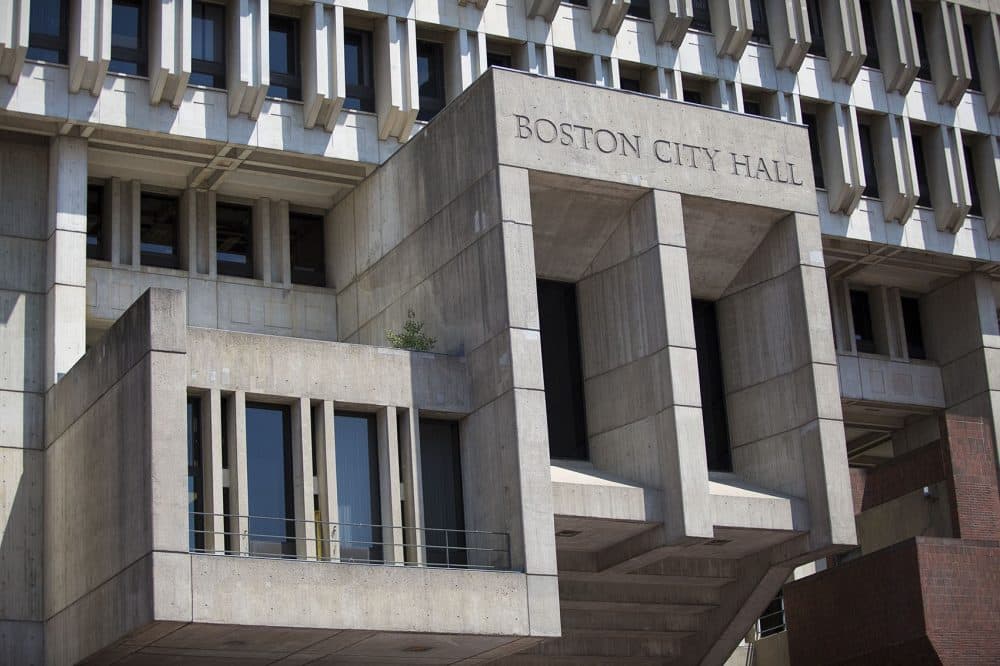Advertisement
City Officials File Stronger 'Trust Act' After Concerns Over Boston Police Cooperation With ICE

Boston is moving one step closer to a stronger immigration "Trust Act," according to Mayor Marty Walsh and City Councilor Josh Zakim, who on Thursday jointly filed a new version of the ordinance.
In a sit-down at City Hall, the two said the proposed revisions to the act — which prohibits the Boston Police Department (BPD) from holding undocumented immigrants based solely on a request from federal immigration officials — aim to better protect Boston's immigrant communities and strengthen trust with local law enforcement.
The new Trust Act is an attempt to further clarify the role of local law enforcement officials in relation to federal immigration laws. It mandates that city and BPD personnel and funds shall not be used to interrogate, detain, or arrest an individual solely for immigration enforcement purposes.
The amended act would prohibit city police from the following:
- Inquiring of an individual’s immigration status;
- Detaining someone solely on the basis of a civil immigration detainer request;
- Providing personal information regarding a person’s release date to ICE solely for the purpose of enforcing civil violations of U.S. immigration laws;
- Making arrests on the basis of ICE administrative warrants, and;
- Performing the functions of an immigration officer.
"Not affirmatively sharing with ICE release dates of folks who are being otherwise released from custody, their personal information if it's not publicly available, I think that's really important," said Zakim, who sponsored the original Trust Act in 2014.
National attitudes toward immigration have changed drastically since then, he said, adding that's why he and Walsh felt updating the act was necessary.
"We don't want our city resources — whether it's BPD or anyone else — enforcing federal immigration law," he said.
Walsh added that no one in the city's administration wants to let dangerous criminals go free, and stressed that this amended act is instead about bolstering trust.
"I think the document shows our shared values here in the city of Boston, certainly our values between the council and the mayor's office," Walsh said.
One of Zakim's priorities, he said, was to ensure the Trust Act is a practical policy that Boston police can administer. The mayor added he felt it important to bring the department into the process.
Advertisement
"I think it's important to have [BPD] at the table as this document is being amended," Walsh said, "so that they understand — not the consequences — but the seriousness that we're taking this issue."
The mayor said he fully expects Boston Police Commissioner William Gross to hand down the new protocols once the ordinance is passed by the city council.
The revisions to the Trust Act follow WBUR's reporting on the 2017 immigration arrest of Jose Martin Paz Flores who was taken into custody shortly after filing a workers' compensation claim. Paz Flores, originally from Honduras, did not have work authorization in the U.S. when he fell off a ladder, breaking his leg while on the job for Boston-based Tara Construction. The company did not have workers' compensation insurance when he fell.
In February, the U.S. Department of Labor (DOL) filed a lawsuit in Boston federal court claiming Tara Construction retaliated against Paz Flores, triggering his arrest by U.S. Immigration and Customs Enforcement (ICE).
Boston police later confirmed its officers were involved in coordinating that arrest and helping verify the identity of Paz Flores.
According to court documents filed in the DOL lawsuit, a so-called "joint ICE/Boston Police Department task force" helped to facilitate the immigration arrest of Paz Flores. Boston police officials confirmed Sergeant Detective Gregory Gallagher represents BPD in this partnership, just as other BPD officers liaise with federal agencies like the FBI and the DEA.
Walsh said Thursday that BPD’s partnership with ICE will continue. He added that relationship is not about finding undocumented immigrants and deporting them, but rather a necessity for the sharing of information that could impact public safety.
“I’m going to encourage the Boston Police Department to have relationships based on information gathering, to be able to make sure the residents of our city are safe,” he said.
When asked whether the BPD/ICE relationship was used appropriately in the case of Paz Flores’ arrest, Walsh responded that it was just “one case.”
“We talk about one case, and again, one case too many — I’ve been very clear on that — but it’s one case,” he said. “I mean, we’re talking hundreds of other cases that we have not been sitting here and rattling off a hundred other names of people that were unfairly targeted by ICE with the cooperation of the Boston Police Department. It’s one particular case.”
The nature of BPD's involvement in the arrest of Paz Flores was at the heart of a Boston City Council hearing in April. City Councilor Lydia Edwards said at that time that if the goal of the Trust Act was to separate Boston police from ICE, "then we need to write a better ordinance."
According to reports filed by the BPD, ICE issued a total of 175 civil immigration detainer requests in the last two years. All of those people were given access to bail and were not transferred to ICE. City officials said those who did not post bail were transferred out of BPD's authority.
The amended ordinance will be introduced to the full city council next week. Both Walsh and Zakim are optimistic it will pass.
This article was originally published on June 13, 2019.
